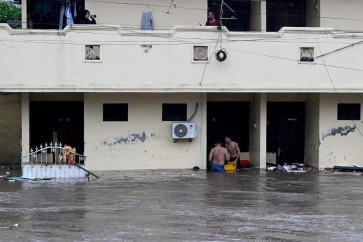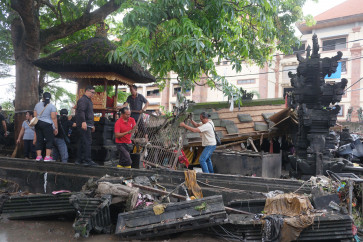Popular Reads
Top Results
Can't find what you're looking for?
View all search resultsPopular Reads
Top Results
Can't find what you're looking for?
View all search resultsWomen fed up and blow the whistle on catcalling
The parking lot in a complex of shophouses in North Jakarta’s upscale Kelapa Gading area seems like a safe place for women
Change text size
Gift Premium Articles
to Anyone
The parking lot in a complex of shophouses in North Jakarta’s upscale Kelapa Gading area seems like a safe place for women. Wrong.
Falla Adinda, 27, finds the place intimidating, if not terrifying. The parking attendant is a little bit too friendly, saying things to her like “Hei cantik, mau kemana? sendirian?” (Hi beautiful, where are you going? Are you alone?).
“I felt uneasy all the time. I just wanted to get out of there as quickly as possible,” Falla, a medical doctor, says. “I never talked back to him. I was on my own and scared.” She has no choice but to tolerate these unwanted encounters since she goes there to shop.
One day, when she saw a policeman walking nearby, she reported the harassment to him. Much to her anger, the officer dismissed her complaint and just laughed when she started taking his picture and threatened to put them on social media.
She duly posted the story and the photo on her twitter account.
“[I] want to tell a story. An unofficial parking attendant near the office always annoys me when I pass by. Catcalling. Made me uneasy. Once I reported this to a policeman, asking for help. I was annoyed and could not act by myself. The officer just grumbled and was reluctant, saying that nothing happened to me. I said I was uncomfortable because I frequent that place.”
Her postings in September quickly went viral.
Those who commented on the story mostly expressed support and some shared their stories. There were a few who put the blame squarely on her, saying that it must have had something to do with the way she dressed. “Some of the ones who blamed me were women,” she chuckles.
The officer’s response reflects society’s prevailing attitude toward catcalling, which includes whistling, shouting or making comments of a sexual nature to passing women. To the perpetrators, it is a guy thing and they feel that no real harm is done to the women.
Salim, an employee who works for a private company in Jakarta, says catcalling is an expression of male domination, and that such a mindset legitimizes male misbehavior toward women.
While it is also a global phenomenon, more and more women, including in Indonesia, are now campaigning to stop this practice, which they say amounts to sexual harassment.
Early this month, Kate Walton, an expatriate who has lived in Jakarta for four years, shared her catcalling experience on Twitter. She said that during a 35 minute walk from Mayestik Market to Plaza Senayan in South Jakarta, she was harrassed 13 times, ranging from men asking for her name and her phone number to a uniformed security guard whistling at her.
“Sexual harassment is a form of violence against women and girls. It is threatening and reminds us of how we are seen by broader society: as objects for men’s enjoyment and use,” she writes on the Coconuts Jakarta website.
In September, a group of Indonesian women launched the Jakarta movement of Hollaback!, joining with women in 55 other cities around the world to fight against catcalling and other forms sexual harassment in the streets.
The impetus to launch the movement in Jakarta came from Angie, a US-born teacher who has lived in Jakarta since 2007.
She recounted her harrowing experience of sexual molestation while biking in Gandaria, South Jakarta, in January last year.
A man on motorcycle grabbed her chest and shouted a profanity at her.
Hollaback! Jakarta initially focused on victims of street harassment but has since widened its scope to encourage witnesses to sexual harassment to join in the conversation.
“We have launched a website, jakarta.ihollaback.org, and an app, Hollaback!, to help victims and bystanders share their story,” says Angie, who insists on being identified only by her first name.
It is a beginning but it could be a long struggle.
Catcalling will not stop and society will tolerate it as long as there is no law against it, says Wulan Danoekoesoemo, the executive director of Lentera Indonesia Foundation, which helps victims of sexual violence.
We are still living in a patriarchal society that treats women as objects, Wulan says. “You are not raped, so what’s the big deal?” says Wulan, citing the most common response to catcalling complaints.
What makes it more challenging is that it is still hard to prove the loss and pain experienced by victims, says Yuniyanti Chuzaifah, the deputy head of the National Commission on Women Against Violence. They may not show any physical scars, but some of them lose their dignity, self respect, self-confidence and live in constant fear.
Several cities around the world have taken steps to criminalize catcalling.
Buenos Aires, the capital of Argentina, introduced a law in September against street harassment with catcallers facing fines of up to 1,000 pesos (US$ 62.90) or community service. In July, Nottinghamshire County in England made catcalling a hate crime.
Yuniyanti says her commission has drafted a bill against sexual violence that makes catcalling a form of verbal harassment. The bill’s early draft calls for a maximum two-year imprisonment.
“We want to change society’s paradigm toward women,” Yuniyanti says. Catcalling is a gate that could lead to more terrible forms of sexual violence, she adds.
One encouraging sign is that the police appear to have caught up and are taking complaints of catcalling seriously.
Following her twitter posting, Falla received a phone call from the Jakarta Police public relations department inquiring more about the incident with the police officer.
“Later, the police officer personally apologized to me. He told me he had been reprimanded and that next time, he would respond differently to complaints about catcalling,” Falla says.
______________________________
Reporting and writing is fundamental to news publication. As part of the effort to equip them with the basics and experience of news reporting and writing, 10 cub reporters of The Jakarta Post’s 2017 batch have recently been tasked with a group-based writing project on five topics of their choice. Their articles will appear in two parts. This is the second part of the Special Reports.










